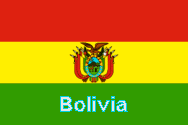In political unrest, looters target Bolivian telecoms, TV offices
 La Paz, Bolivia - The conflict between left-wing populist President Evo Morales and five of the opposition-dominated provinces of Bolivia escalated Wednesday.
La Paz, Bolivia - The conflict between left-wing populist President Evo Morales and five of the opposition-dominated provinces of Bolivia escalated Wednesday.
Looters overpowered national police to invade major telephone and television facilities in the large Bolivian city of Santa Cruz de la Sierra, a day after tax-collection offices were targeted, Bolivian television ATB reported.
The actions are the latest in more than two weeks of protests against the collection of taxes on natural gas production by the Bolivian state, which is trying to raise funds to provide all Bolivians over 60 a pension.
Santa Cruz province is one of five provinces opposing left-wing populist President Evo Morales, with ongoing attempts at referendums that would make them more autonomous and give them more control over energy revenues. The number represents more than half of Bolivia's nine provinces.
On Tuesday, demonstrators cut off gas exports to Brazil. Supporters of the pro-autonomy movement in Santa Cruz - some 900 kilometres east of La Paz - chased away police officers and soldiers who were watching over the tax authority building.
Government Chief of Staff Alfredo Rada described events as "the start of a civilian coup d'état against democracy".
The commander of the Eighth Division, General Marco Bracamonte, said soldiers will use real weapons from now on, to command more respect after being physically-attacked.
"We only look after the things that belong to the Bolivian state. We are not protecting any given politician," he stressed.
On Wednesday, protestors looted the telephone company ENTEL, Bolivian television said. Mobile phone and Internet services were cut off, and contact between Santa Cruz and the rest of Bolivia was very difficult.
The regional facilities of the TV network Television Boliviana in Santa Cruz were also looted. Their filming and editing equipment was burned, and vandals set fire to a vehicle.
"Nothing else here is any use, and they took computers, mobile phones, armchairs. And whatever they could not take away they ended up burning in the street," a reporter for the television network ATB said.
In a separate development, militants of the Union Juvenil Crucenista, a radical right-wing government opposition group, burned a bridge in the Pailon area, linking the villages of San Julian and Cuatro Canadas. The area is populated mostly by migrants from western Bolivia, who generally back Morales.
Supporters of Morales are demanding a tougher stance from the central state against violent groups in opposition-controlled provinces.
In August, Morales survived a recall referendum with some 67 per cent of the votes in favour of him staying.
He had requested the vote in a bid to consolidate his power after a series of recall referenda pitting him against the country's wealthy provinces over regional autonomy.
The Bolivian opposition has turned the pro-autonomy movement in several of the country's regions into a tool to attack the government, which has sought a redistribution of the country's resources to improve the lot of the impoverished indigenous majority.
Morales was elected in late 2005 to become Bolivia's first Indio president.
During a five-year mandate that is set to expire in 2011, he has pushed through a new constitution and enacted a series of socialist reforms to aid the poor native population in the mountainous west.
Since the beginning of the year, citizens in four provinces have approved referenda, by large margins, for greater autonomy from the national government, which would grant them control over key natural resources, including natural gas.
Morales declared each vote unconstitutional and void, but was unable to stop them from being held.
Bolivia has a population of 10 million. Around 60 per cent live in poverty, most of them Indios. (dpa)